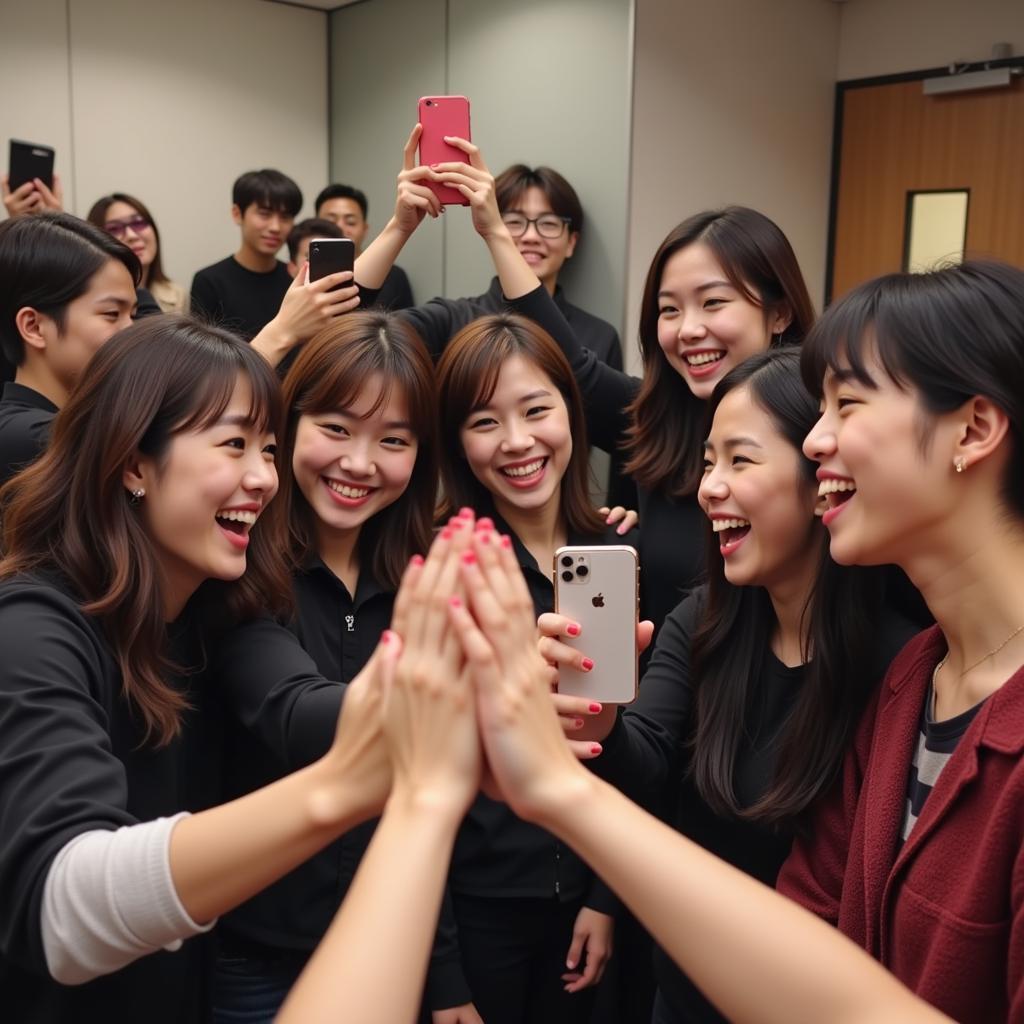Fan service in Kpop refers to actions or behaviors performed by idols, specifically designed to elicit positive reactions from fans. While it can often involve genuine displays of affection or appreciation, it’s primarily a strategic tool employed by Kpop agencies to further solidify the bond between idols and their devoted fanbase. This can range from seemingly innocuous interactions like winking at the camera to more intimate gestures like blowing kisses or making heart shapes with their hands.
Delving Deeper into the World of Kpop Fan Service
 Kpop group making a heart with their hands
Kpop group making a heart with their hands
The intricacies of fan service in Kpop run far deeper than surface-level gestures. It’s a carefully crafted element, meticulously planned and executed, aiming to cultivate a sense of closeness and intimacy between idols and fans. This manufactured “closeness” serves a crucial role in the Kpop industry, as it directly translates to increased album sales, concert ticket purchases, and overall brand loyalty.
For instance, during live performances, idols might single out a fan from the audience, making direct eye contact and singing directly to them. This personalized interaction, though fleeting, can leave a lasting impression on the fan, fostering a sense of special connection and deepening their emotional investment in the idol.
The Dichotomy of Fan Service: Genuine Affection or Calculated Strategy?
While fan service is undeniably a calculated aspect of the Kpop industry, it’s important to acknowledge that it doesn’t always stem from purely strategic intentions. Many idols genuinely care for their fans and engage in fan service as a way to express their gratitude and affection. They understand the immense support they receive from fans and reciprocate it through these seemingly small gestures that hold significant meaning within the Kpop fandom culture.
However, a clear distinction needs to be drawn between genuine expressions of affection and orchestrated fan service designed purely for commercial gain. It’s this ambiguity that often fuels debate and discussion amongst fans, raising questions about authenticity and the true nature of the idol-fan relationship.
The Evolution of Fan Service in Kpop
 Kpop idols interacting with fans
Kpop idols interacting with fans
Over the years, fan service in Kpop has evolved alongside the industry’s growth and globalization. What was once limited to simple gestures and interactions has now expanded into more elaborate forms, often incorporating fan-favorite tropes and storylines.
For instance, agencies now release behind-the-scenes content showcasing idols engaging in playful banter, teasing each other, and exhibiting seemingly close friendships. This carefully curated content feeds into the fans’ desire for a glimpse into the idols’ “real” lives, further blurring the lines between staged interactions and genuine camaraderie.
Navigating the Complexities of Fan Service
As Kpop continues to captivate global audiences, fan service remains an integral, albeit controversial, element of its appeal. While it can undoubtedly foster a sense of connection and intimacy between idols and fans, it’s crucial to approach it with a discerning eye.
Fans should be mindful of the commercial aspects driving fan service while also appreciating the genuine affection many idols hold for their dedicated fanbase. Ultimately, understanding the nuances and complexities of fan service allows for a more balanced and informed appreciation of the multifaceted world of Kpop.
Expert Insight:
“Fan service is a double-edged sword,” says Dr. Lee Soo-Min, a sociologist specializing in Kpop fandom culture. “While it effectively strengthens the bond between idols and fans, it also raises questions about authenticity and the commodification of affection. It’s a delicate balance that requires both parties to engage with awareness and respect.”
Frequently Asked Questions about Fan Service in Kpop
1. What are some common examples of fan service in Kpop?
Common examples include: winking, finger hearts, aegyo (acting cute), blowing kisses, making heart shapes with their hands, fanchants, hi-touch events, and dedicated fansign slots.
2. Is all fan service in Kpop fake?
Not necessarily. While some aspects are undoubtedly staged, many idols genuinely care for their fans and express their affection through fan service.
3. Why is fan service so important in Kpop?
It strengthens the idol-fan bond, boosts album sales and concert ticket purchases, and contributes to the overall success of Kpop groups.
4. Can fan service be harmful?
It can be harmful if it creates unrealistic expectations of idols or if fans become overly possessive.
5. How can I be a responsible consumer of fan service?
Be mindful that it’s often part of a larger strategy, appreciate genuine displays of affection, and respect the boundaries between idols and fans.
Exploring Other Facets of Kpop Fandom
If you’re interested in learning more about the intricate world of Kpop fandom, check out these related articles:
Remember, engaging with Kpop, like any other form of entertainment, should be an enjoyable and enriching experience. Understanding the role of fan service allows for a more informed and balanced perspective on the dynamics between idols and their devoted fans.
Need further assistance navigating the world of Kpop?
Contact us! Our team at FansBongDa is here to help! Reach us at:
Phone Number: 0903426737
Email: fansbongda@gmail.com
Address: Tổ 9, Khu 6, Phường Giếng Đáy, Thành Phố Hạ Long, Giếng Đáy, Hạ Long, Quảng Ninh, Việt Nam.


